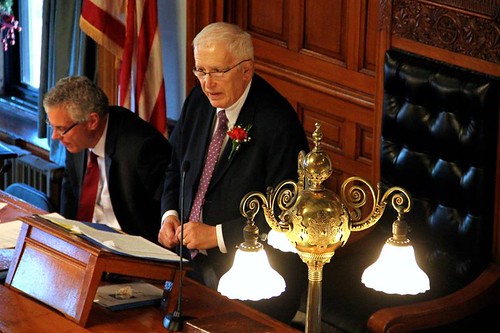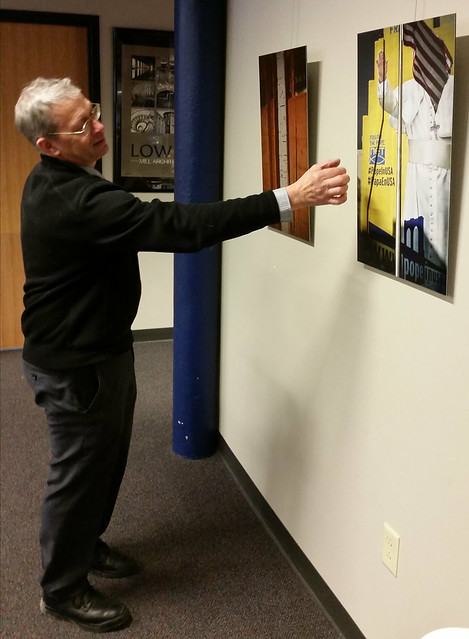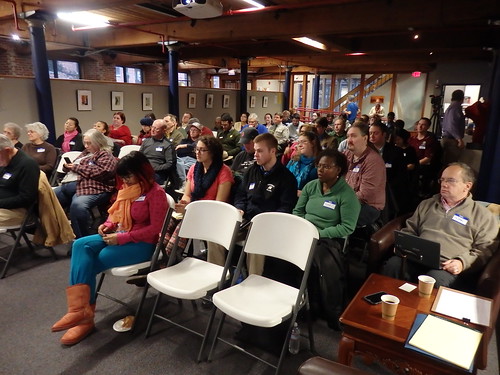Lowell Week in Review: January 7, 2018

Mayor Samaras. Photo courtesy of Jennifer Myers
Mayor Samaras
On Tuesday morning, City Councilors elected William Samaras to be the next Mayor of Lowell. Here is how the roll call vote went:
Councilor Cirillo: “Bill Samaras”
Councilor Conway: “John Leahy”
Councilor Elliott: “John Leahy”
Councilor Kennedy: “William Samaras”
Councilor Leahy: “John Leahy”
Councilor Mercier: “John Leahy”
Councilor Milinzzo: “William Samaras”
Councilor Nuon: “William Samaras”
Councilor Samaras: “William Samaras”
City Clerk Michael Geary: “The chair recognizes as the next Mayor of the City of Lowell, Councilor William “Bill” Samaras.”
Samaras began his remarks by recognizing the former Mayors who were in attendance (fellow councilors Rodney Elliott, Edward Kennedy, Rita Mercier and Jim Milinazzo; State Senator Eileen Donoghue; and Patrick Murphy and Bill Martin). Samaras closed his remarks by thanking his family, especially his wife Joyce.
Mayor of Lowell is an intriguing political office. On paper and often in practice, it is seen as a ceremonial position. That’s true, to some extent. It is the mayor who welcomes dignitaries, cuts ribbons and gives speeches, all important tasks in any community. But the office also has a great deal of what might be called “soft power,” meaning that the power is not formally recognized by charter or law, but it is there to be exercised should the person serving as mayor choose to do so.
Plan E invests the City Manager with all executive power of city government, but most people outside the city (and many within) either don’t know that or don’t realize the legal implications of that, and so the “ceremonial” mayor of Lowell is often viewed by outsiders much as they view “strong mayors” in other communities.
But the “soft power” of which I speak is much more than a misperception by outsiders. Perhaps the most important task of the mayor of Lowell is to serve as the liaison between city government and the school department. As the chair of the council and the chair of the school committee, the mayor is the only person who bridges those otherwise separate spheres. Because of the sheer size of the school department and its budget, and the number of residents the school system directly affects, having the school side and the city side of local government working cooperatively is essential to a well-functioning city. As the only person with formal authority on both the city side and the school side, the mayor plays a critical role in ensuring these two entities work cooperatively.
Another source of a mayor’s power is the words employed in speeches and other remarks. Because the mayor has so many opportunities to speak in public, what he or she says sets the tone of city government. Words matter. With that in mind, here is my transcript of the speech given by Bill Samaras Tuesday morning after he was chosen by his council colleagues to be the city’s next mayor:
Mayor Samaras inaugural address
“First, I would like to thank my fellow councilors for their support in allowing me to be mayor of the city of Lowell. Since coming to the city council, I have come to realize one thing: I am part of a team. Each member of the council is important to the well-being of the city.
We are all here to represent our constituents. However, in a number of cases we have a difference of opinion on how to reach our goals. But that difference of opinion and our willingness to work together gives us the strength to do what is best for the city.
I realize that the position of mayor in the city of Lowell is in most ways ceremonial as we do have a city manager who is the chief executive of the city. But the role of the mayor is an integral position of civic leadership in the plan e system in that he or she becomes the voice of the city council.
Nobody embodied the importance of that role more than the outgoing mayor, Edward Kennedy. I think we can all agree that Mayor Kennedy’s leadership truly made a difference. If it weren’t for his efforts to ensure the people’s voices were heard on the future of Lowell High School, we would be in a very different position today.
In November, those voices were heard loud and clear. Now that the voters have given the council guidance on the location, it is up to the city council to ensure that we build the best Lowell High School that we can. That is why I support Downtown Option 3.
The question of Lowell High School has always been more than just a political issue for me. For 19 years, Lowell High School was my passion, my life’s work. As the former Headmaster of Lowell High School, I can only hope that my background is a benefit in this process and not a hindrance or a problem. I plan to approach the issue of Lowell High School as Mayor as I did as Headmaster for 19 years: With an emphasis on equity and opportunity, always putting the students first.
That having been said, I realize the issue of the high school questions has been contentious and at times divisive. I feel that over the next two years we must work together to bring this community back together.
There are also many other issues that this city council will have to deal with. We will continue working on the good work already achieved on public safety and economic development. As a city councilor for the past four years, I have seen that much of the most important work that city councilors do is through the subcommittee process.
With that experience in mind, as mayor, I propose establishing several new subcommittees with the approval of the city council, to meet the evolving needs of our community. One will be a subcommittee on senior citizens to ensure that some of our most vulnerable citizens have a voice in this administration. If you think of the weather we’ve been having and what’s going on out there, it is important that we listen to our seniors.
Likewise, we should establish a subcommittee to deal with issues related to nonprofit organizations. In order for Lowell to thrive, we need ongoing, constructive communications between the city and these important partners. When we talk about the homeless, and what our role is a city, we need to work together with these important organizations. The more we work together, the better it is for the city.
We have already established an ad hoc subcommittee to look at Lowell’s election laws. Government works best when it is reflective of the people it serves. As Mayor, I’m fully committed to seeing that vision realized.
Finally, I’d like to end by talking about partnerships. Lowell is very fortunate to have some of the strongest partnerships in the Commonwealth. Historically, because of those partnerships, Lowell has positioned itself to be one of the best mid-sized cities in the country. And those partnerships I speak of, include the Lowell Plan, a group of local businessmen and business women, who come together to work for the benefit of the city. Together, they have and we have achieved some very important economic initiatives including the building of LeLacheur Park and the Tsongas Arena. We also have an important partnership with the University of Massachusetts Lowell which has been instrumental in helping many major companies to relocate to the city. Middlesex Community College has been an agent of opportunity that provides the region with a trained workforce that possesses the skills needed for the twenty-first century. As mayor, I will work to ensure that these partnerships are maintained and strengthened, as I believe they are vital to what makes Lowell successful.
There’s another group of partners that I’d like to acknowledge as well: Our local media, namely the Lowell Sun and WCAP. It is no secret that the past election cycle was contentious in many ways. Certainly in Lowell there is room for a difference of editorial opinion and passionate debate on issues is not only welcome, it’s essential in a democracy. Our local media will play an important role in the next two years, not only in keeping our citizens engaged and involved, but also in bringing our community back together as we move forward. I’m expecting that support. We have to work together. If we don’t, as a city, it can fail. But it will not fail with everyone working together and rowing in the same direction.
Let me close by saying that I do realize that as mayor, I’m just one of nine, but I do believe that working together, this new council will create an atmosphere needed for Lowell’s future growth and development. I’ve often spoken of my mentor, Dr. Patrick Mogan. Pat had a phrase that has always stuck with me for many years. It was always about “taking things to the next level.” Together, I believe this council, each one of us, will be able to take the city of Lowell to the next level, and I’m humbled at being tasked to be part of that.”
I thought this was a good speech. It was short – the late Paul Sullivan used to say “no one ever complained about a speech being too short” – but it was also substantive. While he emphasized the importance of the council working together as a team, he also tackled some controversial issues head on. For instance, her praised outgoing Mayor Ed Kennedy for his leadership on the Lowell High School issue and was unequivocal in support for Downtown Option 3 for the new Lowell High School, which is the plan that involves the taking by eminent domain of the “dentists’ office” on Arcand Drive.
But the location for the high school was not the only controversial issue Mayor Samaras touched upon. One of them – his desire to strengthen the city’s partnership with UMass Lowell – would seem self-evident, but it has not been in recent years when much hostility towards the University has emanated from the City Council chambers. By highlighting the importance of the UMass Lowell/City of Lowell partnership in his inaugural address, Mayor Samaras served notice that he, at least, recognizes the importance of the University to the city.
The other subtly controversial item Mayor Samaras discussed was his desire to strengthen relations between the city and the city’s nonprofit sector. Whether it’s been about property taxes (which nonprofits don’t pay), supporting the homeless, or supporting immigrants, Lowell nonprofits met varying levels of hostility from city councilors during the prior term. By highlighting the importance of the nonprofit sector to the city, Mayor Samaras made it clear that he considers nonprofits to be valuable contributors to the city while at the same time making it clear that those same nonprofits must work cooperatively with city government for the good of the city as a whole.
January 2, 2017 Council Meeting
The new city council had its first regular meeting of the year the evening of the inauguration. The agenda was brief and the atmosphere seemed collegial which was good. I posted my notes from the meeting that evening, but here’s a brief synopsis:
Councilor Ed Kennedy had a couple of motions regarding the process for switching the Lowell High School option that the city had previously submitted to the Massachusetts School Building Authority. Councilor Rita Mercier had a motion to explore the creation of a monument to the Laotian people of Lowell on JFK Plaza. Councilor Rodney Elliott had one motion for a report on the use of city vehicles by city employees and another for a report on expenditures to date on the new Lowell High School project.
At the end of the agenda, Mayor Samaras moved successfully to suspend the rules in order to discuss the ongoing problems with heat at Lowell High School. The council engaged in a lengthy discussion of this topic during which City Manager Murphy informed councilors of his plan to address the situation on an emergency basis. Councilors questioned Jim Green of the city’s Department of Public Works, who is leading the effort to rectifying problems with heat in the high school and a number of other city buildings.
Agenda for January 9, 2017 Council Meeting
Between December meetings that were cancelled due to the holidays and the new council just taking office, the “Communications from the City Manager” and “Response to Motions” sections of the agenda for this coming Tuesday’s council meeting are light.
However, there are five new council motions:
Councilor Cirillo – Request City Manager have the DPW Commissioner provide City Council a list of non-operational or disrepair items no later than August 10th, of every year which are vital to our municipal buildings working properly for our Fall-Winter season of 2018.
Councilor Cirillo – Request City Manager direct the law department to provide the City Council with a report on the feasibility of creating an ordinance that would require the City Council to include a line item in the budget for deferred maintenance issues in all municipal buildings.
Councilor Nuon – Request City Manager provide information regarding major projects in the City as well as information regarding UMass-Lowell projects.
Councilor Nuon – Request City Manager provide information regarding outreach in hiring process; including breakdown of results in following categories: race; gender; veteran status; and residency.
Councilor Milinazzo – Request City Manager report on the appropriate protocol for downtown snow removal.

Tony Sampas explaining the composition of a photo
Tony Sampas photo exhibit
Thanks to everyone who braved the cold yesterday and made it down to LTC to see a sampling of photographs by Tony Sampas. I could photograph the same scene as him one hundred times and not have a single image that would come close to Tony’s work.
Many of those at the event were Lowell Walks regulars, so we also discussed possible walk topics for this season. That schedule should be out by the end of February.

Crowd at 2014 Lowell Social Media Summit
Twitter for Lowell
Also at the Tony Sampas exhibit was an individual I follow on Twitter, one of small group of people who regularly tweet about things happening in Lowell. We got to talking about Twitter and its unrealized potential for sharing local news and information.
My Twitter-friend expressed a strong desire for local elected officials, councilors and school committee members, to get on Twitter and use it to stake out their positions and their reasoning on important local issues. This person lives in Lowell but works out of town and given that schedule, knows of no reliable way to get this information otherwise.
World leaders, for good or for ill, use Twitter to make front page news every day. Councilors and school committee members should consider doing the same. In today’s media environment, to reach everyone, you have to be on every channel. While there may be a scarcity of Lowell posting tweets regularly, quite a few Lowell residents are already on Twitter, and consume it for their news and information. Twitter has become my primary source for world, national and state news, along with sports and weather updates. I think many others use it in the same way. The gap is in Lowell news from local sources. To be fair, most Lowell Sun reporters make excellent use of Twitter, but that’s part of their job. Elected officials and citizen journalists are needed, along with a greater diversity of voices and opinions. Perhaps it is time for another Lowell Social Media Summit. We had two of them, in 2013 and 2014. They were well-attended and quite successful. But please don’t wait for that – get on Twitter and start tweeting about Lowell.